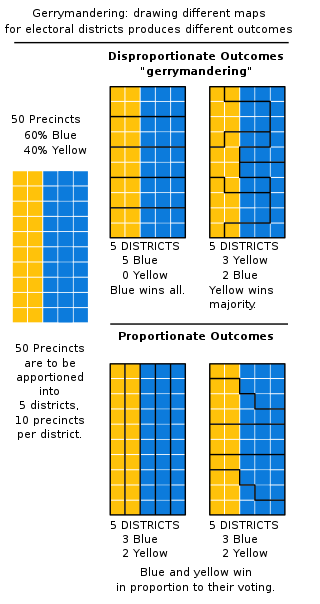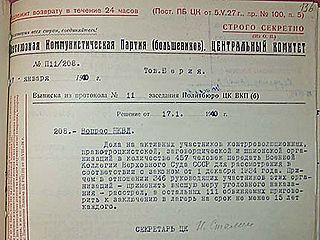
In representative electoral systems, gerrymandering is the political manipulation of electoral district boundaries to advantage a party, group, or socioeconomic class within the constituency. The manipulation may involve "cracking" or "packing". Gerrymandering can also be used to protect incumbents. Wayne Dawkins, a professor at Morgan State University, describes it as politicians picking their voters instead of voters picking their politicians.

A politburo or political bureau is the highest political organ of the central committee in communist parties. The term is also sometimes used to refer to similar organs in non-communist parties, such as the Political Bureau of Hamas. Politburos are part of the governing structure in most former and existing communist states.

In the United States, politics functions within a framework of a constitutional federal republic. The three distinct branches share powers: the U.S. Congress which forms the legislative branch, a bicameral legislative body comprising the House of Representatives and the Senate; the executive branch, which is headed by the president of the United States, who serves as the country's head of state and government; and the judicial branch, composed of the Supreme Court and lower federal courts, and which exercises judicial power.

The Politburo of the Chinese Communist Party, officially the Political Bureau of the Central Committee of the Communist Party of China, is the highest political body of the Central Committee of the Chinese Communist Party.

Primary elections or primaries are elections that are held to determine which candidates will run for an upcoming general election. Party primaries are elections in which a political party selects a candidate. Depending on the country and administrative division, there may be an "open primary", in which all voters are eligible to participate, or a "closed primary", in which only members of a political party can vote.

Each of the 50 U.S. states, the District of Columbia, and five territories of the United States holds either primary elections or caucuses to help nominate individual candidates for president of the United States. This process is designed to choose the candidates that will represent their political parties in the general election.
A candidate, or nominee, is the prospective recipient of an award or honor, or a person seeking or being considered for some kind of position; for example:
Nomination is part of the process of selecting a candidate for either election to a public office, or the bestowing of an honor or award. A collection of nominees narrowed from the full list of candidates is a short list.
A political organization is any organization that involves itself in the political process, including political parties, non-governmental organizations, and special interest advocacy groups. Political organizations are those engaged in political activities aimed at achieving clearly-defined political goals, which typically benefit the interests of their members.

The Spanish transition to democracy, known in Spain as la Transición or la Transición española, is a period of modern Spanish history encompassing the regime change that moved from the Francoist dictatorship to the consolidation of a parliamentary system, in the form of constitutional monarchy under Juan Carlos I.
In United States politics and government, the term presidential nominee has two different meanings:
- A candidate for president of the United States who has been selected by the delegates of a political party at the party's national convention to be that party's official candidate for the presidency.
- A person nominated by a sitting U.S. president to an executive or judicial post, subject to the advice and consent of the Senate.

The Instituto Nacional Electoral (INE) is an autonomous, public agency responsible for organizing federal elections in Mexico, that is, those related to the election of the President of the United Mexican States, the members of the Congress of the Union as well as elections of authorities and representatives at local and state levels. The agency's president is Guadalupe Taddei Zavala, appointed in 2023 for a 9-year tenure.

The Sixth Party System is the era in United States politics following the Fifth Party System. As with any periodization, opinions differ on when the Sixth Party System may have begun, with suggested dates ranging from the late 1960s to the Republican Revolution of 1994. Nonetheless, there is agreement among scholars that the Sixth Party System features strong division between the Democratic and Republican parties, which are rooted in socioeconomic, class, cultural, religious, educational and racial issues, and debates over the proper role of government.
In a governmental system, a party leader acts as the official representative of their political party, either to a legislature or to the electorate. Depending on the country, the individual colloquially referred to as the "leader" of a political party may officially be party chair, secretary, or the highest political office.
Preselection is the process by which a candidate is selected, usually by a political party, to contest an election for political office. It is also referred to as candidate selection. It is a fundamental function of political parties. The preselection process may involve the party's executive or leader selecting a candidate or be some contested process. In countries that adopt Westminster-style responsible government, preselection is also the first step on the path to a position in the executive. The selected candidate is commonly referred to as the party's endorsed candidate.

The Puerto Ricans for Puerto Rico Party was a Puerto Rican political party. Founded in 2003, it was certified for the first time by the State Electoral Commission in May 2007.

The election of the president and the vice president of the United States is an indirect election in which citizens of the United States who are registered to vote in one of the fifty U.S. states or in Washington, D.C., cast ballots not directly for those offices, but instead for members of the Electoral College. These electors then cast direct votes, known as electoral votes, for president, and for vice president. The candidate who receives an absolute majority of electoral votes is then elected to that office. If no candidate receives an absolute majority of the votes for president, the House of Representatives elects the president; likewise if no one receives an absolute majority of the votes for vice president, then the Senate elects the vice president.
N.Y. State Bd. of Elections v. Lopez Torres, 552 U.S. 196 (2008), was a case decided by the United States Supreme Court that involved a constitutional challenge brought against New York State's judicial election law, alleging that it unfairly prevented candidates from obtaining access to the ballot. The Supreme Court rejected this challenge and held that the state's election laws did not infringe upon candidates' First Amendment associational rights. Several concurring justices emphasized, however, that their decision reflected only the constitutionality of the state's election system, and not its wisdom or merit.

An electoral or voting system is a set of rules used to determine the results of an election. Electoral systems are used in politics to elect governments, while non-political elections may take place in business, non-profit organisations and informal organisations. These rules govern all aspects of the voting process: when elections occur, who is allowed to vote, who can stand as a candidate, how ballots are marked and cast, how the ballots are counted, how votes translate into the election outcome, limits on campaign spending, and other factors that can affect the result. Political electoral systems are defined by constitutions and electoral laws, are typically conducted by election commissions, and can use multiple types of elections for different offices.











